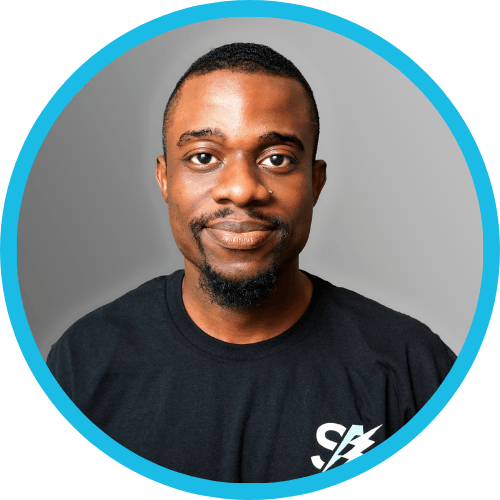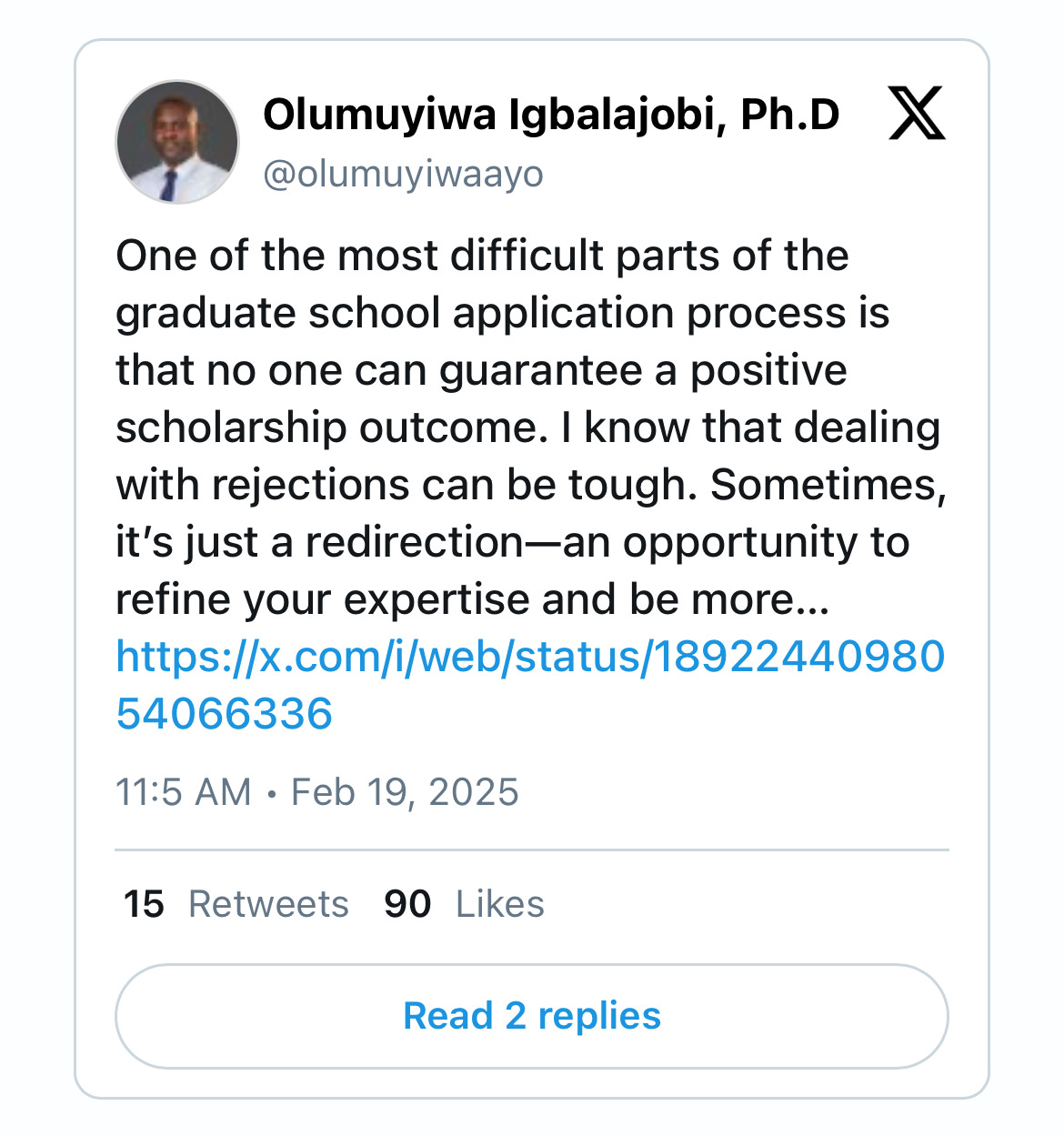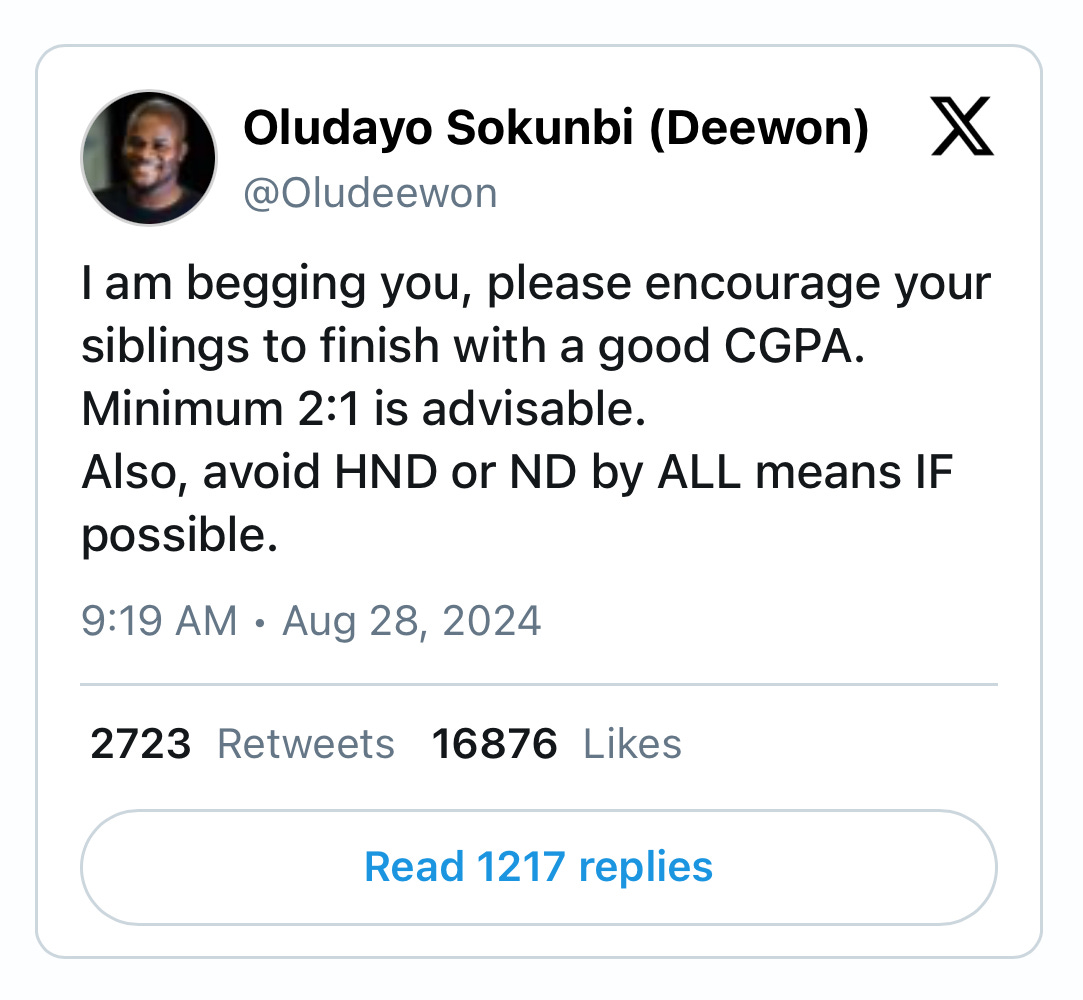Is My Profile Good Enough for a Scholarship?

Welcome to another edition of ScholAfrica. If this was forwarded to you, you can subscribe here.
Almost every week, I get this question from an international applicant:
I finished with a 2.4 CGPA; do I stand a chance to get fully-funded scholarships?
Today, I will give you some easy steps to answer that question for yourself.
Cost Savings
A Nigerian, Tunde, asked a very interesting question on X (Twitter):
I want to rephrase that to “What is the African Dream?”. My response to that is “To travel out.”
A lot of us want to travel out. We will do whatever it takes. So we submit a lot of applications, “shooting our shot”, in case anyone works out. After all, it only takes one “Yes”.
But this leads to a big problem. We waste a lot of money on application fees and sending application documents. I know this because I wasted so much money, too.
This newsletter will help you avoid spending money on schools where you don’t have a good chance.
Let’s do some math:
Application fee: $75 (on average)
Sending official GRE: $20
Sending official transcript: $20
Total: $115 per school
If you apply to 10 schools, that is $1,150 spent on applications.
This newsletter will help you save that money by applying wisely.
The Bitter Truth:
No one can guarantee you a scholarship.
I had a 4.65/5.0 CGPA in my Bachelor’s degree and a 3.92/4.0 CGPA in my Masters (from a US University). Even with these scores, some universities still rejected me for my PhD.
We all want guarantees in life. “Just tell me which universities will give me a fully-funded scholarship.” But the truth is no one can say for sure - not even the program coordinator.
Why? Because many factors decide who gets in:
How much funding the department has for that academic year
How many students applied
How strong your application is compared to others
How many students they plan to admit that year.
All these determine if the admission committee picks you for a scholarship or not.
So, in life, there are no guarantees. But there are probabilities.
Even though nothing is certain, we can increase our chances of success by making good choices.
What Schools Are Looking For:
Universities are in the business of education.
They are not just looking for people to give free money. They want to invest in strong students who will build great careers and give back to the school as alumni.
Every applicant is judged by how valuable you are to the department.
The good news is that you have a lot of ways to show that value in your application profile.
Here is what schools look for in your application:
Transcripts - Do you have the right background knowledge for this program?
Academic CV - What is your education and relevant work experience in detail?
Statement of Purpose (SOP) - Why do you want to study this program? What’s your story?
2-3 Recommendation letters - What do other experts have to say about you?
Test scores (GRE, GMAT, etc.) - Can you handle the rigor of the U.S. educational system?
English Proficiency (TOEFL, IELTS, Duolingo, etc.) - Can you learn in English?
After looking at all this, they can tell if you will be a good investment or a bad investment.
Among all the application documents, your CGPA plays an important role.
The Importance of CGPA:
Having a strong GPA opens doors that you never expected. Deewon on X said it another way.
You will be admitted into an academic program. The educational standard in the U.S. is high, and the admission committee wants to be sure you can cope.
And trust me, self-hype is not enough.
I have a Nigerian friend who came here for her Masters in Mathematics. She struggled so much that she had to drop out and switch to study nursing at a community college.
You need to be mentally prepared for it.
Your CGPA shows the admission committee that you can handle the program. If you did well before, you are more likely to do well again.
But what if you finished with a low GPA?
I have met many amazing African students who came here with 2-2 and third-class degrees.
They had to show it in other areas of their application packet.
My Ghanaian friend, Blessing, who I studied with at BGSU, is a great example. He got scholarships for his Master’s and Ph.D.
I recommend you listen to our interview here to hear his story.
As you improve your application, you must also find schools where you have a good chance.
Finding The Right School:
You can’t get admitted everywhere.
Even with my strong CGPAs, I was rejected from several schools. I wasn’t honest with myself when I first applied.
I wanted to go to Harvard and other Ivy League schools - but my profile didn’t match what they were looking for.
You have to be smart about your applications so that you don’t waste time and money.
The best way to do this is to apply to safety schools.
As an African applicant, your profile is not viewed the same as someone with a U.S. degree. That’s just the reality.
So, add safety schools to your mix, even if you are applying to the big boys.
Safety schools have an acceptance rate of over 70%. You can find the acceptance rate of any U.S. university on Google.
Bowling Green State University: 81% (where I did my Master’s)
Kennesaw State University: 67.2% (where I’m doing my Ph.D.)
The acceptance rates are mostly for undergraduate admissions (without scholarships). It gives you a sense of how competitive that school’s application is. Harvard University has an acceptance rate of 3.2%
Putting It All Together:
No one can guarantee you a U.S. scholarship.
However, you can significantly improve your chances of getting funded by:
Being very honest with yourself
Strengthening your application
Applying to the right schools.
Remember that admission is not the goal, but admission with a scholarship.
That’s all for this week.
See you next Wednesday.

Whenever you're ready, there are 2 ways I can help you:
The Scholarship Accelerator: My detailed mentorship program specifically designed to help you secure U.S. scholarships for your Master's and Ph.D. You will learn the 14 steps you need to take to relocate to the U.S., and a Telegram community to ask me any questions you have during the process.
F1 Visa Interview Consultation: Get your F1 visa in your next interview. I combine my five F1 visa interview experiences with my expertise in learning from visa officers to prepare you for your visa interview thoroughly. We will identify your strengths and prepare you to deliver them confidently. Your story is the secret to your visa approval.






